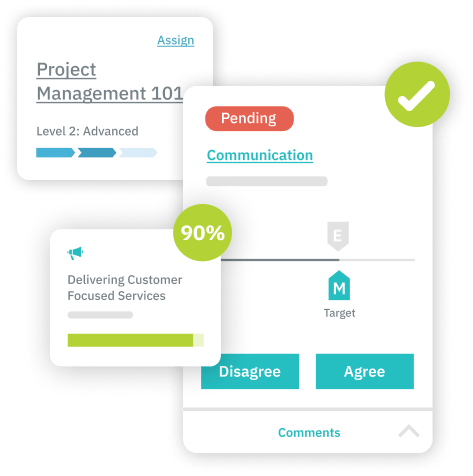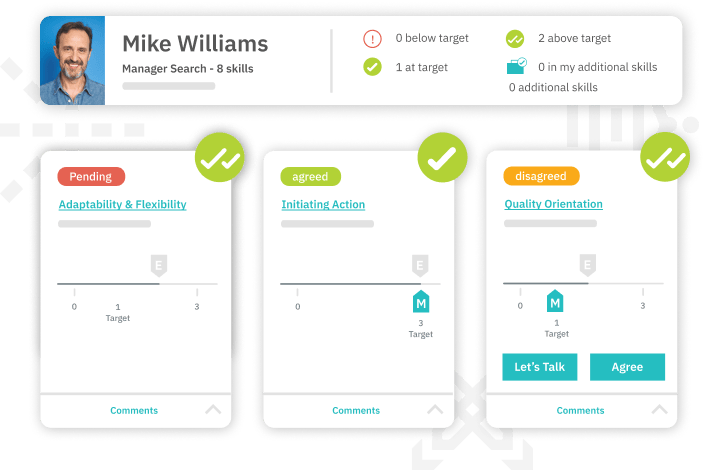
Competency and Assessment Tools
Know exactly what your people can do
Our platform provides the competency and assessment tools you need to deploy tailored job-based assessments that measure the skills most relevant to an employee’s role, according to your career architecture. Learn exactly what your employees can do so you (and they) can apply their talents now and plan their future development.

Competency and Assessment Tools
Organizations in nearly every industry can benefit from competency and assessment tools, which are paper or electronic systems designed to help you measure and evaluate staff competency in a myriad of skills specific to their role within the organization.
There is little argument that employees do their best work when they have adequate training and skills to perform the job. The result is higher engagement, improved quality, and ultimately, increased customer satisfaction. However, too many employers never implement successful competency evaluation simply because it looks complicated and overwhelming without tools (and we often think tools will be too costly to sell to the c-suite, right?). The truth is that the right competency tools are worth their weight in gold and are relatively easy to sell when you can demonstrate the positive impact on the bottom line. By implementing electronic competency assessment tools, human resources and other key stakeholders can transform individual performance and organizational results.
Competency assessment tools can bridge the gap between an employee’s existing skill set and the skills required for success in their position by assisting both the employee and the employer in identifying areas of growth and opportunity. Once these needs are identified, customized training programs can be developed, allowing the organization to invest in the most relevant and impactful education and support for each unique employee.
Tools like this are used in a myriad of processes. Examples of competency assessment tools include those used pre-employment to evaluate candidate competency in relevant skills; during employment as a part of a periodic performance evaluation; or when considering an employee for a transfer to a new role or department within the organization. In many cases, organizations use a competency measurement tool to satisfy the requirements of regulatory bodies because of the clear results and thorough documentation that these systems provide. Some organizations also use competency assessments to sell their staff or services to clients.

Gap analysis
Assess the gaps between your employee’s current skills and the targeted skill benchmarks to accomplish organizational goals.

Unbiased skill verification
Assess, rank, and verify skills to understand gaps between self-perception and manager ratings. Identify ingredients for alignment, feedback, goal setting, and development.

Curated Learning Plans
Understand your employees’ strengths and gaps so you can direct their professional development based on where they are, where they’d like to be, and what your company needs.

Documented new skill development
When employees learn new skills, they can document their achievements, request feedback from their manager, and track their progress toward development goals.
Choose Your Starting Point
All three options strengthen clarity across skills, readiness, and talent risk.
The difference is where you start—diagnosing trust, building the foundation, or seeing decisions in action.
Automate
Create skill profiles, create detailed job descriptions, align learning content with specific skills, and chart clear career path progressions to set the foundation for effective talent management.
Automate includes:
- Create Skill and Competency Profiles
- Develop Job Descriptions
- Map Learning to Skills and Competencies
- Map Career Path Progressions
Assess
Effectively assess their employees’ skills, identify gaps, and implement strategies to develop a skilled and competent workforce prepared to meet current and future challenges.
All the Automate features plus the ability to:
- Create a Skills Inventory
- Conduct Gap Analysis
Engage
Organizations can significantly enhance their talent development strategy and workforce effectiveness by assessing employee skills, curating personalized learning paths, recommending appropriate career paths, and tracking career goals.
All the Automate features plus the ability to:
- Assess Employee Skills and Competencies
- Curate Personalized Employee Learning Paths
- Recommend Employee Career Paths
- Track Career Goals
Optimize
Building talent pools, measuring employee performance, tracking certifications, and conducting multi-rater feedback enhance talent management, ensure compliance, and foster organizational leadership development.
All the Engage features plus the ability to:
- Build Talent Pools
- Measure Employee Performance
- Track Employee Certifications
- Conduct Multi-Rater Leadership Feedback
Trusted by Leading Companies Worldwide




Your Workforce is Evolving — Be Ready for What’s Next
Read our eBook
Competency Based Performance Appraisal Examples
Competency based assessments are used throughout a number of talent management processes: they’re used to evaluate the competency of candidates vying for a position within the company; they can be used to evaluate competency of current staff in coordination with performance evaluations; and they can be utilized when evaluating a team member for a promotion or transfer.
Types of competencies with examples, or competency examples with performance statements, include:
- Communication – is able to effectively communicate with colleagues and clients, even when the subject is sensitive or difficult to convey; prepares for difficult conversations in advance; communicates effectively in written and spoken word
- Resources management – utilizes and allocates organizational resources efficiently and responsibly
- Teamwork – collaborates effectively with interdisciplinary team members; recognizes the value of each role in the team; listens and considers other viewpoints
- Customer service – anticipates customer needs; demonstrates a client-focused approach to challenges; recognizes innovative ways to improve customer experience
- Inclusion – respects and celebrates diversity among coworkers and clients
There are a variety of ways the organization can leverage the competency assessment. Examples include:
- To clearly communicate job expectations and standards
- To provide employees who desire to grow in the organization with clear guidance so they know which skills to refine in order to qualify themselves for promotion or movement
- To establish tangible and individualized goals and objectives
- To improve the success of selection process, driving higher retention and improved performance among new hires
Organizations that haven’t yet incorporated competency into their performance evaluation process might use phrases like, “Employee is doing well,” or, “No known issues in the past twelve months.” Organizations who have are able to provide much clearer feedback for their team members through the competency based performance appraisal. Examples include, “Employee meets deadlines while ensuring quality of work,” and, “Employee takes full accountability for timeliness and quality of work.”
Still, the most common question remains: how to evaluate competency in employees.
Competency Assessment Methods
There are three primary competency assessment methods: self-assessments, in which the employee evaluates their own level of competency; manager assessments, in which the manager evaluates the employee’s competency; and 360-degree assessments, in which the employee is evaluated by managers, peers, and subordinates. All three of these methods can be completed using manual process or software specifically designed for competency assessment purposes.
The benefits to using software over a paper-and-pencil approach are many:
- The competency assessment process is automated, which improves timeliness and consistency of assessments
- Every competency assessment checklist is maintained for as long as you need it and easy to access when requested by mangers or auditors
- The tool is non-discriminatory and consistent across all employees, promoting fair and equitable assessments
- The employee can access their assessments when they need to, as they work on their goals and development throughout the year, helping them stay focused on growth
The first step is coordinating with your software provide to develop a competency assessment questionnaire for each stakeholder who will receive it (and that will depend on whether you elect to do self-assessments, manager assessments, 360-degree assessments, or all three). When you elect to do this manually, you have to develop those questionnaires from scratch, but when you work with a software vendor, you have pre-written items to choose from.
In short, competency assessment software can save time, promote fair hiring and pay practices, drive improved employee performance, and support transparent conversations about performance with substantially less investment of time and effort than manual processes.

